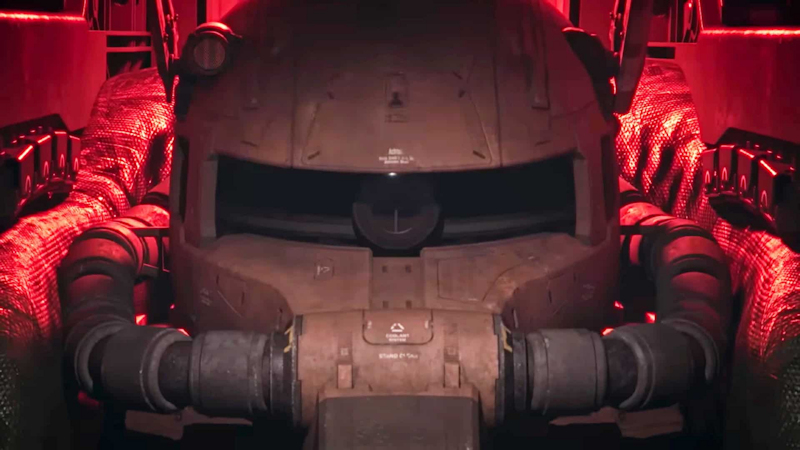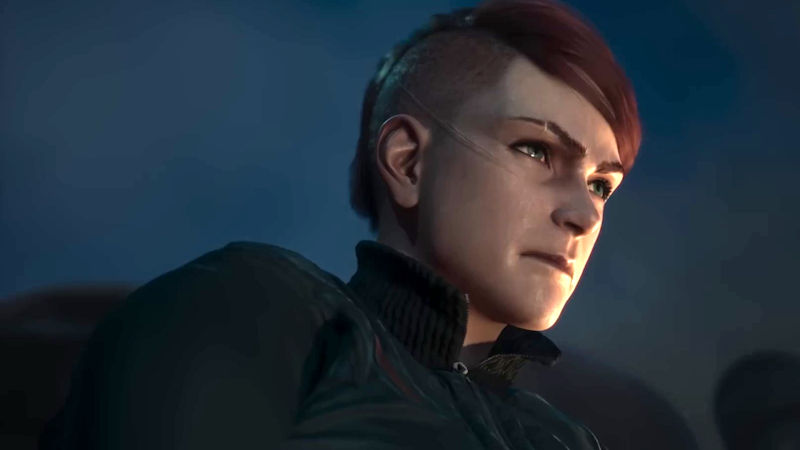
Written by Ross Locksley on 18 Oct 2024
Distributor Netflix • Certificate NA • Price NA
While Gundam has been utilising CGI for some time, a series made entirely in that vein has been absent from the franchise until now. An ambitious collaboration with Netflix, this six part series directed by a pretty green Erasmus Bosdau (Origin Zero, Altered Carbon: Resleeved) and written by Gavin Hignight (Transformers War for Cybertron, Tekken: Bloodline) it's probably fair to say that this Gundam project wasn't exactly conceived or directed by A-List talent. But everyone has to start somewhere I suppose.
To be fair, this is actually a lot better than I expected given the creative team. In the wider Gundam historical context, this takes place in the latter stages of the war as part of the EFSF Operation Odessa, which drove Zeon forces back into space. Watching the conflict exclusively through the eyes of Zeon soldiers as they begin to lose gives the series a pleasingly fresh touch.

The mecha at least moves and fights in captivating ways - this is what you'll be watching for.
The story follows Captain Iria Sorari of the Zeon Federation and her unit, stationed on Earth as part of the original One Year War. She and her Wolf team of Zaku pilots find themselves pursued by a new Gundam unit that continuously decimates the Zeon forces while they try to find a way to combat this seemingly invincible force.
In this at least there's an element of Steven Speilberg's breakout 1971 feature, Duel, in which a man is chased by a truck. We never see the driver or understand the motivation, but it's absolutely relentless in tracking down its prey. With Requiem for Vengeance, this takes place over 4 of the 6 episodes, and these for me were the highlight. Had we wrapped it up there, I think I might have been much happier.
However, the final two episodes reveal a little too much and subsequently the delicious mystery is ended. The remainder of Sorari's unit is tasked with capturing an EFSF mobile unit so they can deconstruct it to find exploitable weaknesses. By the end, I have to admit to feeling somewhat deflated by the conclusion, which I won't spoil here.
In terms of production, lets start with the good; the mecha looks great on-screen (though I have nitpicks with some of the designs, especially the Gundam which is completely removed from the design style of the era) and move in a convincing manner as weight and momentum all seem to be taken into account. The sheer size and power is often demonstrated by showing how the units just dominate whatever space they're in, especially against ground units or human combatants. Picking up a piece of broken building looks effortless, but switching to the viewpoint of the soldiers as the structure crushes them is very effective. The power of the beam weapons compared to even the Zaku's considerable shell-based artillery is striking, with death waiting at every wrong turn. In terms of mecha combat, I found myself highly satisfied. There are some bravura scenes too, my favourite of which is Sorari's imagined concert, watching her walking barefoot onto the stage in a flowing red dress, violin in hand, the act descending into horror as the red dress flows outward, turning into blood and flowing over an applauding audience of familiar corpses. This felt genuinely cinematic.

Meet painfully generic leading haircut Iria Sorari.
The issues arise from the human characters. Their mouths seem unable to show a full range of motion when talking, perhaps to make the various regional dubs easier to match, but coupled with puppet-like movement it all looks very stilted and unnatural, throwing the viewer into an uncomfortable uncanny valley that acts as a barrier between the viewer and empathy for the characters. The designs are also yawnsome - must we really have yet another female lead with that bloody activist haircut? (You know the one). It's so generically "edgy" that it might as well be a mohawk at this point, a visual shorthand for rebellious personality that's a huge turn-off. It doesn't help that Sorari's sole motivation for joining the war is massively undermined by her final choices, and I'm sure I won't be the only one feeling the whiplash from this sudden about face, delivered entirely in narrative exposition before the credits role. It's about as clumsy as Poochy returning to his home planet in The Simpsons.
Hignight's inability to write fluid dialogue really hurts this show, as is common with his projects. The overall story beats work fine (aside from the conclusion) and where he does take inspiration, at least it seems to come from quality sources like the aforementioned Duel. But in terms of natural conversation, likeable characters and attractive leads, he's just hopeless. I suspect his work would improve dramatically if he hired a dialogue consultant, in much the same way Crimson Tide is so much better for Tarentino's input on the script, but left to his own devices he seems desperately limited, and this critically wounds Gundam: Requiem for Vengeance. Even that title is a bit crap, honestly.
So is it worth a watch? Yes, I think so. The visuals give the film some artistic value and it really does have some glorious moments, though these mostly surround the abject panic when the Gundam appears. You'll likely forget most of the characters 2 minutes after the final credits role, but you'll remember some of the better scenes where severed Zaku heads crash to the ground or the team rides a half-destroyed Zaku tank across beautiful countryside. It's a shame that such a high-profile release fails to show off the rich and thoughtful world of the larger Gundam universe.

Ross founded the UK Anime Network waaay back in 1995 and works in and around the anime world in his spare time. You can read his more personal articles on UKA's sister site, The Anime Independent.
by Ross Locksley on 25 Nov 2025
by Ross Locksley on 24 Nov 2025
by Ross Locksley on 11 Nov 2025
by Ross Locksley on 08 Nov 2025
by Ross Locksley on 07 Nov 2025
by Ross Locksley on 05 Nov 2025
by Jamie Morris on 27 Oct 2025
by John Carlo Rayas on 20 Oct 2025